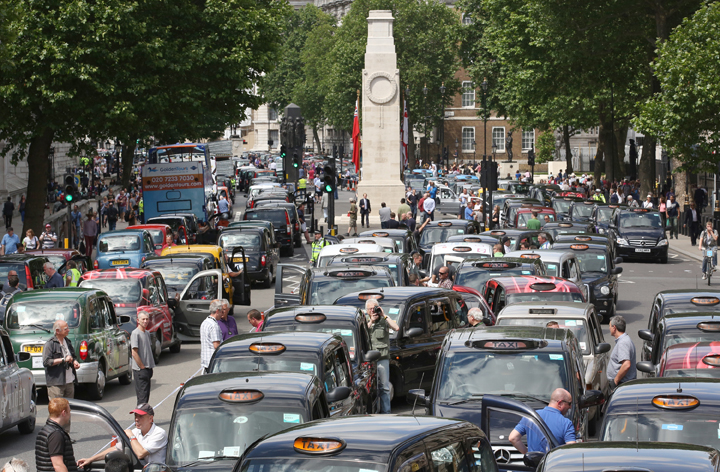Update (June 13): Uber Toronto general manager Ian Black contacted Global News to clarify that Uber only works with municipally licensed taxi and limousine drivers in Toronto.

Black added that the example of the London protests should not be applied to the Toronto market, as Uber feels it has a positive relationship with drivers in the city.
“In Toronto the drivers that we work with are extraordinarily happy with our service,” Black told Global News. “They use Uber because they are able to get more fares and make more money and they are treated fairly through that process.”
———
TORONTO – Commuters in several European cities were faced with traffic chaos Wednesday as taxi drivers took to the streets to protest Uber, an app that allows users to hail a cab from their smartphone.
In London, England over 12,000 of the city’s famous black cab drivers clogged the streets surrounding Trafalgar Square, despite the Metropolitan Police warning drivers taking place in the protest they could have their licenses revoked.
READ MORE: European taxi drivers protest Uber app
Similar scenes unfolded on the streets of Paris, Berlin and Madrid.
European taxi drivers say apps like Uber are threatening their livelihood and breaking local taxi rules.
Uber, who earned US$258 million in financing from Google Ventures in 2013, allows users to book taxi rides through its smartphone app. The trip fare is calculated using the driver’s taxi meter app.
Uber’s prices vary from city to city and the fare is paid later by credit card.
London black cab drivers say that the app acts as a taxi meter – breaking a British law that reserves the right to use a meter for licensed black taxis.
“We think this is contrary to Transportation for London’s (TfL) own regulations, which state that only we can use a meter, but that’s been sidestepped on the technicality that, being an app, the Uber meter is not “fitted” to the vehicle as it is in a hackney cab,” wrote London cab driver Ian Beetlestone in a column for the Guardian.
GALLERY: London black cabs stop traffic in protest
Beetlestone added that due to the nature of the app Uber drivers are arranging jobs for themselves – something that minicab drivers are prohibited from doing in London.
“Taxi drivers agree with us all over the world – there have been protests and legal action from Berlin to New York and the company has been barred from operating in several cities,” Beetlestone wrote.
And Beetlestone is right – Uber has stirred up controversy in both Toronto and Montreal, the only two Canadian cities the company operates in currently.
Kristine Hubbard, Operations Manager at Beck Taxi, said Toronto’s taxi drivers have also felt the pressure of car-for-hire apps.
“Drivers are feeling like they are being abandoned – they think ‘What have I been paying all this for, why have I been following the rules?’ Taxi drivers already feel like they are easy targets,” Hubbard told Global News.
Hubbard, who has been closely following the taxi protest in London, said the issue has become so turbulent because of the reputation behind the black cab drivers.
Hubbard said she could see similar protests breaking out in Canadian cities, but noted that Toronto cab drivers currently are more worried about the taxi reform bill being presented at City Hall.
READ MORE: Toronto Taxi Alliance launches campaign to oppose city reforms
But the car-for-hire app trend has put pressure on taxi operators to develop mobile apps.
Beck Taxi was the first in Toronto to release a taxi ordering app – even ahead of Uber and Hailo, which also operates in Toronto – but Hubbard said the app only results in 17 per cent of their business.
The company maintains that is has not seen an impact on business thanks to Uber, but it does raise regulatory and customer service concerns.
“They are offering services to people who have expensive smartphones and credit cards,” Hubbard said, adding that not everyone has access to those tools.
“As you move into the model where taxi drivers or limo operators say ‘Hey, I can get more money from the wealthier clients,’ suddenly reduces the market to people who can’t afford those prices and don’t use that technology.”
The City of Toronto is already taking Uber to court for operating without a license.
















Comments